This post is synchronized with a simulcast on BlackGate.com (Jan 25, 2021 posting).
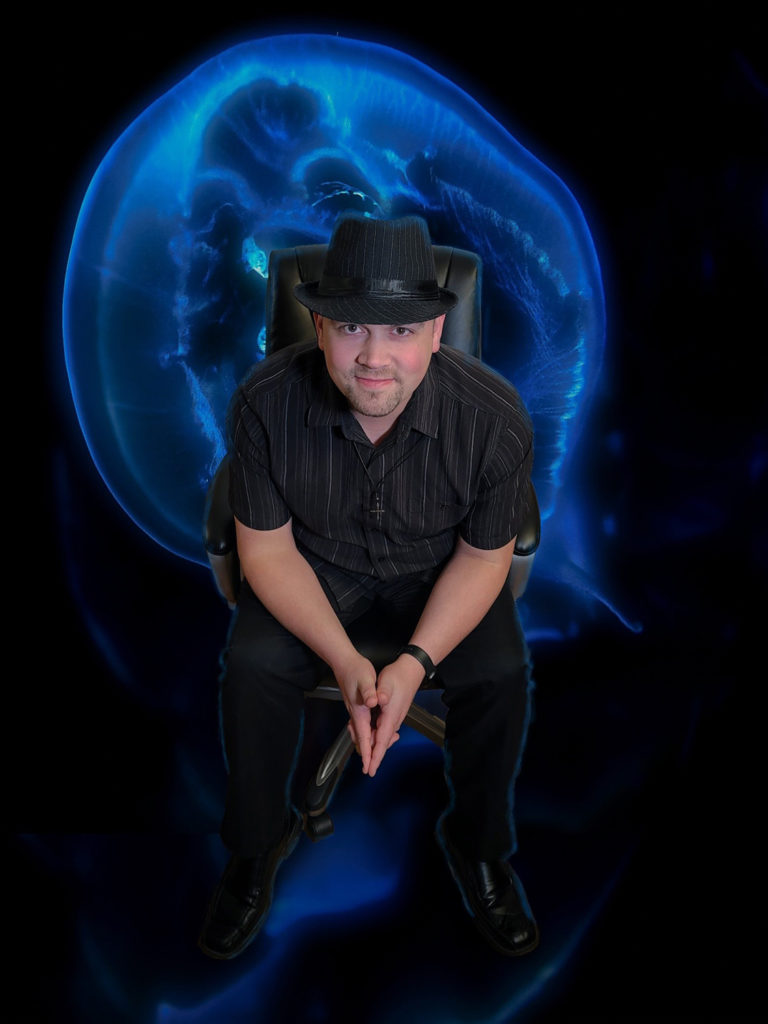
Art & Beauty in Weird/Fantasy Fiction
It is not intuitive to seek beauty in art deemed grotesque/weird, but most authors who produce horror/fantasy actually are usually (a) serious about their craft, and (b) driven by strange muses. These interviews engage contemporary authors & artists on the theme of “Art & Beauty in Weird/Fantasy Fiction.” Recent guests on Black Gate have included Darrell Schweitzer, Sebastian Jones, Charles Gramlich, Anna Smith Spark, & Carol Berg. This one features Byron Leavitt, novelist and game-author for Diemension Games.
Byron Leavitt is also the author of the bizarre children’s novel The Fish in Jonah’s Puddle (To Say Nothing of the Demon) and the non-fiction book Of Hope and Cancer: One Man’s Story of God, Darkness, and Wonder, as well as the story content for the board game Deep Madness and its accompanying book Shattered Seas (recently reviewed on BlackGate). Byron is currently working on the storybooks for the forthcoming Deep Madness prequel Dawn of Madness, a story-driven horror experience in a board game.
“Darkness. Light. Wonder. Beauty. God. Tentacles. Those who know me best would say that pretty well sums me up.” - Byron Leavitt
Interview Table of Contents/Links
- WHAT’S THE SCOOP WITH YOUR ICONIC FEDORA?
- BODY HORROR, MUTATIONS & CANCER
- FINDING BEAUTY IN DARK PLACES
- DO YOU THINK GOD ENJOYS HORROR?
- RELIGION IN WEIRD ART
- YOUR CHARACTERS
- WORKING ON A TEAM, IN A SHARED UNIVERSE
- WHAT SCARES YOU? IS IT BEAUTIFUL?
- OTHER DARK ARTS, YOUR DRAWINGS
- MOVIE INFLUENCES
- FUTURE WORKS
(1) WHAT’S THE SCOOP WITH YOUR ICONIC FEDORA? IS IT HIDING TENTACLES?
BL: Definitely. Actually, I never used to like hats. But then one of my characters, who I thought was a really cool guy, wore a fedora, so I decided maybe hats weren’t so bad. I bought a fedora on a trip and have been wearing them ever since. I suppose that’s an instance of life imitating art.
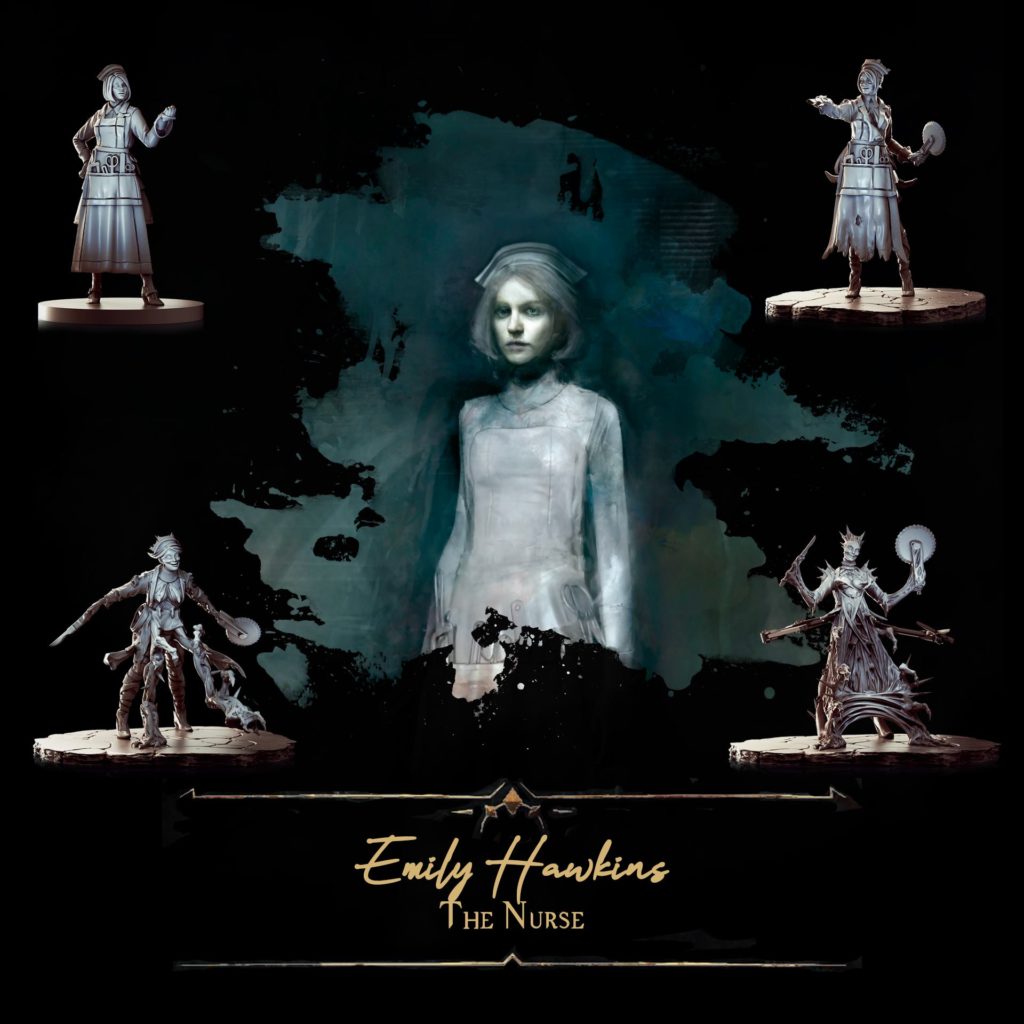
(2) BODY HORROR, MUTATIONS & CANCER
SE: You went into remission from recurring Hodgkin’s Lymphoma and a bone marrow transplant, which you discuss in your book Of Hope and Cancer. Considering that, and your penchant for mutating characters in Deep Madness (in which characters mutate into tentacled creatures) and Dawn of Madness (in which every character/wanderer has three alternate versions of his or herself; see inset images of Emily and Lynas’s malformations), we have to delve into how your condition affected your writing. Please tell us how your cancer experience shaped your art (nightmares)?
BL: That’s an excellent question! To be perfectly honest, though, I don’t think my experiences there influenced me that much. I know that’s a boring answer, but I was pretty weird before I got cancer. Plus, I really can’t take credit for a lot of the ideas in Deep and Dawn. Roger Ho, Cherry Li, and the Diemension Games team formed the basics for most of the characters before bringing them to me to flesh out.
I can think of one area that may have impacted me, though – or at least skewed me even further in a specific direction. I’ve always loved monsters and felt a strong connection to them, but I think my experience deepened those feelings. People tend to treat you differently when you have cancer (or likely any serious disease or condition). Or, rather, they don’t know how to treat you. You become diseased, unusual, and scary to them. You transform into an outsider, and others lose all sense of how to handle this “new you.” They don’t mean anything by it, and it’s not even necessarily a conscious action, but looking at you is just too close to staring at their own mortality. So, in a sense, you become a monster to them: a cautionary tale that is easiest to deal with if avoided, or a dark specter they know is real but which they want to put out of their minds. I think it’s very likely that this influenced me, drawing me even closer to empathizing with those on the fringes: the outsiders – and the monsters.
(3) FINDING BEAUTY IN DARK PLACES
SE: I post an excerpt from your book Of Hope and Cancer in which you describe finding beauty from places everyone else runs from. Given this, and your passion for horror, can you speak on the appeal of art that many may feel is repulsive? What joy do you get from playing in bloody rain?
“Beauty in the Rain: Oftentimes when it begins to rain, I will decide it is time to go for a walk. I will put on my coat and my hat, and as everyone else flees indoors I will step out into the downpour and tumult to begin the trek down our long gravel driveway. I smell the freshly cleaned air. I hear the rain colliding with the leaves, the branches, the road. And I feel the beauty of something greater than me. I find myself steeping in awe, being consumed by wonder. … Don’t get me wrong: I know that the rain is wet and cold and at times even oppressive. I understand why people would want to avoid it. I even do myself sometimes. But I also think that by not stepping out into the rain, by not taking that chance of getting wet, we sometimes miss out on the beauty that is as fresh as a glistering raindrop on a flower.” - Byron Leavitt
BL: I have a dirty secret: my main goal is not to scare people with my writing. (Except for Dawn of Madness – though even that one has layers.) I am much more interested in taking readers to places they’ve never been and filling them with a sense of wonder and awe. Then, any other emotions or feelings accompanying those two sensations are a bonus that comes with the territory. I have heard other authors and creators who I respect say something like this as well. Junji Ito comes immediately to mind (who everyone should read whether they like manga or not.) In the realm of film, Guillermo del Toro has expressed similar sentiments. I think Lovecraft himself must have felt similarly to some degree, which is one reason why I believe his stories still resonate with people despite all the hang-ups and roadblocks that now exist between him and new readers. He took you to places you had never seen before. He stole your breath away first with the setting, the adventure, and the dazzling, wondrous “what if.” Then he crushed your lungs with the massive, incomprehensible otherworldliness of it all when you finally realized what was going on. This is the kind of horror that really gets me: the stuff that causes its reader to say, “Whoa…” before it makes her yelp, “GAH!” And if the two can be intertwined along the way, all the better. (The movie Annihilation is one of my favorites for this very reason.)
I am implacably drawn to awe. I feel like my life’s mission is, in a sense, to cultivate wonder. And I think these emotions are almost always tied to discovery, which very often plumbs life’s uncharted dark fringes. Exploring the unknown can be a truly exhilarating, life-changing (or affirming) experience. But it’s also one of the things that scare us the most. A massive chunk of horror revolves around the fear of the unknown and what exists in that nebulous, uncharted place – whether that place is the woods, the ocean, another planet, a long-forgotten temple, or just in the darkness itself. What exists beyond our solid, everyday walls of concrete and steel? What happens when you peel back the skin of what we perceive as reality and peer underneath? It’s very easy when exploring to find something absolutely breathtaking. But, at the very next moment, that same beautiful discovery can reveal its wild unearthly underbelly and send a thrill of terror shivering down your spine.
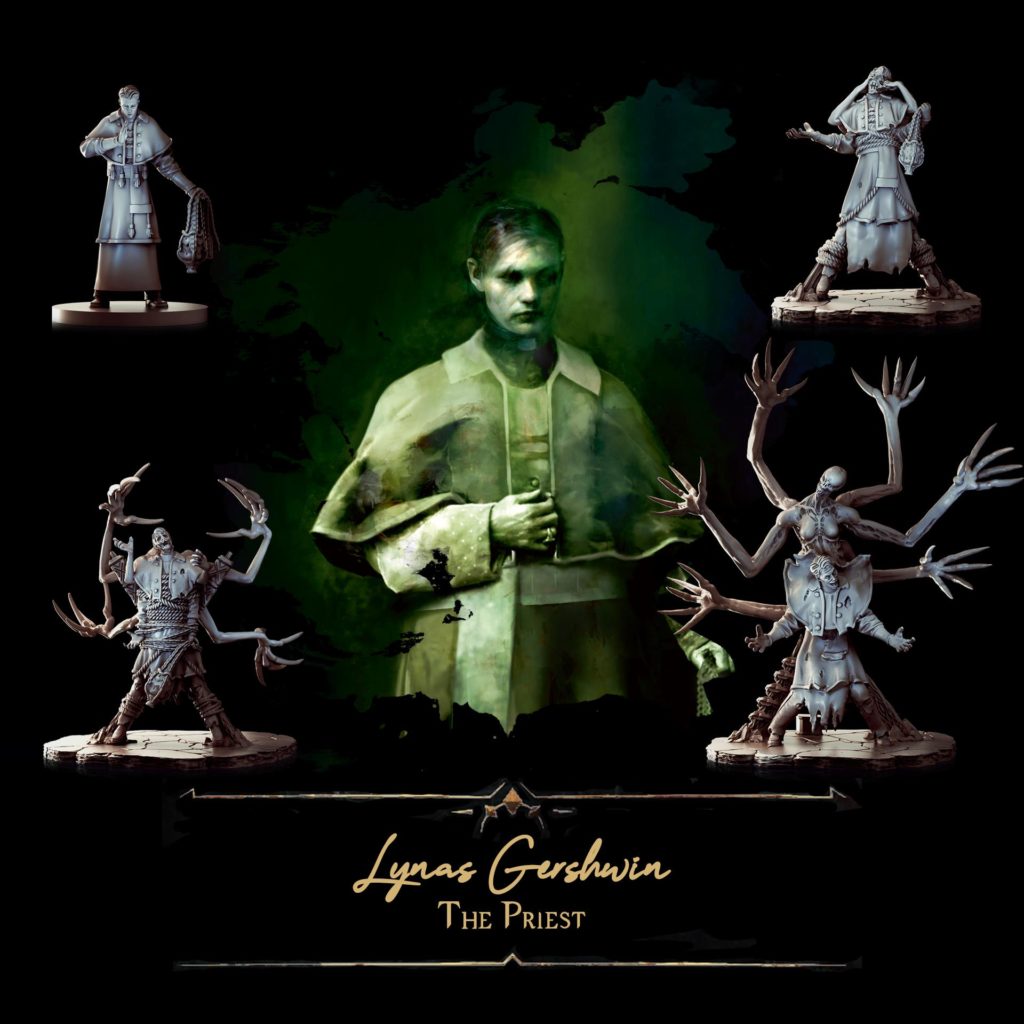
(4) DO YOU THINK GOD ENJOYS HORROR?
SE: You have written that you see God as “co-authoring” your destiny/fate. So it seems you have a spiritual god/muse who likes to write. Many may laugh at that, and it is funny I suppose, but many horror writers are not promoting violence or wishing fear on others. So why would God want to write in the horror genre?
BL: Writing is a form of creation, and the Judeo-Christian Bible starts with God doing just that: creating. And I don’t personally think he was just forming what we would typically consider beautiful: He was fashioning the dark, squirmy things like the angler fish, the eel, and the spider. And I consider that a comforting thought. In fact, when I was growing up, the two things that made me think I wasn’t wholly deranged were deep-sea life and the book of Revelation from the Bible.
Some things are absolutely terrifying to us without being innately evil or devious in themselves: they’re just not a part of our framework or within our comfort zone. For example, the book of Revelation is chock full of uncanny, horrifying beings – and most of them are the good guys. Actually, the stuff in there (as well as in other places, like Isaiah and Ezekiel) is so extreme that some people think I’m borderline blasphemous when I discuss it with them. For instance, there are angelic beings (possibly the Seraphim or their relatives, though they aren’t explicitly named) who are entirely covered with eyes. As in, they have dozens (or hundreds) of eyes blinking all over their bodies and six wings. Plus, only one of them has a human face, and I’m not sure any of them has a human shape. Then there’s Jesus, who is depicted in several ways. One is as a lamb who has been cut open – who also happens to have seven eyes and seven horns. He takes and holds a scroll, too, making me think he must have hands. And it further seems likely to me that he must be standing on two legs as he opens and reads the sealed scroll. Then, in another place, he has white hair that glistens like snow, eyes that burn like flames, a face as bright as the sun, and a literal sword for a tongue. He holds seven burning stars in his hand and, when he speaks, his voice is as loud and layered as multiple rivers rushing at once. “Meek and mild” my butt.
To actually answer your question, though, I don’t know that God so much likes to write in horror as that he just specializes in the strange and unexpected. Having said that, I have often felt like watching horror has brought me closer to God, or at least made me consider the world in a different way. I know that sounds patently ridiculous, but hear me out. Horror is, in my opinion, the genre most likely to step beyond the bounds of normalcy – even more so than science fiction or fantasy (though both of those can and do.) And it’s outside of that space where I am most likely to experience something beyond myself. So, I am more likely to see or consider something that makes me look at things in a different way while watching horror. (This is not always the case, obviously, and it might not even be the truth most of the time. No one has ever had an epiphany while watching a Jason movie, for instance.) It also doesn’t hurt that many horror movies have what I would call a spiritual component. Some are more blatant – and more of a gut punch – than others. The Conjuring films come immediately to mind, and so does The Exorcism of Emily Rose. Or the indie movie Ink. Or the Japanese picture Re-Cycle. Even The Exorcist itself (and certainly The Excorcist TV show.) There’s also the Showtime show Penny Dreadful. Alternatively, in books, many of Stephen King’s works have a spiritual aspect, such as The Stand. I’m not saying these things are common in horror, but they may be more common than in any other genre right now.
Light is most discernable in darkness. So, in my mind, the darkest genre can be a wonderful place to find (or create) sparks of light. I guess I’ve always just seen “wondrous” and “terrifying” as siblings, or two sides of the same coin – much like light and dark. And I can easily draw one out of the other. Furthermore, if the Bible is to be believed, then so can God: “…Darkness was over the face of the deep… And God said, ‘Let there be light.’”
(5) RELIGION IN WEIRD ART
SE: Sticking with the religion theme. Your website has a tab for Weird Church that is awaiting content, and Shattered Seas features an Irish priest with Connor Durham...and Dawn of Madness will feature Lynas! Please discuss how/why you feature religion in your work?
BL: Religion is a huge part of me, and so is weirdness. I felt for a long time like I was living in two worlds: in one I had to fit in a square hole, and in the other I was pushed into a round one. The problem is, I’m more of an octopus shape. Octopuses are good at squeezing into a variety of spaces, but every once in a while they just want to be an octopus. So, Weird Church is going to be my attempt to unite those two worlds. A lot of my writing, too, is really me trying to merge those two realms, or at least play in both at once. I don’t think they have to be exclusive domains. In fact, I think in many ways they are surprisingly complimentary.
Lynas actually was a creation of the team, so I can’t take credit for him. Connor, however, is entirely mine. Whether I create them or not, though, I usually seem to find anchor characters in most projects I work on who can kind of ground me in whatever I’m doing. Connor was that character in Shattered Seas for me. Samuel was that investigator in the main Deep Madness game. And Lynas is probably that wanderer in Dawn of Madness. Beyond that, though, I often try to interweve themes into my stories like redemption and sacrifice, or things that will offer glimmers of light in the claustrophobic emptiness. Those foundational Judeo-Christian bedrocks are what often makes a character and a story compelling to me. That doesn’t mean things always go well: actually, it seems like they normally go pretty terribly. But having those flickers of hope in the darkness and seeing how the characters respond to adversity is, for me at least, what gives the work a depth it would otherwise lack.
There is a mystery, a sacredness, that I feel is missing from our world today. We have lost that weighty sense of Other in our largely empty materialistic lives. I find the wonder, the beauty, we have lost in religion and myth. That isn’t to say I discount science or anything of the like: I love studying science. But I do have a major problem with materialism. It is very hard for something to nourish the soul when it doesn’t believe or acknowledge that the soul exists. I believe religion and the sacred fill that cavernous void left by the yawning emptiness of our materialistic worldviews.

(6) YOUR CHARACTERS
SE: Which character do you identify most with? The writer in Dawn of Madness? Connor Durham or Lucas Kane from Shattered Seas? And I need to learn more about Dr. William West who emerges as the most interesting non-playable character and even antagonist in Shattered Seas, the core Deep Madness story and its Oracle’s Betrayal expansion. He obviously resonates with you. Tell us about him.
BL: There’s a little bit of me in most of my characters, and I love just about all of them for different reasons. My favorite for Shattered Seas is probably Connor Durham, though Charles Ryan (the closest I’ll likely ever come to combining Jason Momoa and a Bioshock Big Daddy) is definitely up there, too. After them, probably Min Wang and Mitsuko Takenaka, and then maybe Regan Waite and William West.
William was a creation of the team (as were all of the Deep Madness investigators,) and they had the basic structure for him in place before I came along. But he’s definitely a fun character to play with. Roger Ho (Diemension’s lead designer/creative director/CEO/fearless leader) was a little surprised by how evil William ended up being in Shattered Seas, but he’s always been that level of monster in my mind. It’s always a kick playing with a character who is simultaneously brilliant, deranged, and deluded like William. It’s also fun playing with characters who are in more of a grey area, like Regan Waite. I don’t think I’ve really done more than scrape the surface with her. I’m honestly still not entirely sure if she’s good or evil, and I think that’s probably a good thing.
(7) WORKING ON A TEAM/SHARED UNIVERSE
SE: With Shattered Seas Leavitt extends the world created by the Diemension Game team (with designers Roger Ho, Cherry Li, Chauncey, and Yichuan Wang, whom Byron dedicated the book to… in addition to the KS backers). How does the creative process work with the team (game designers, artists, writer/you, your backers)? Like, do you have any input on character design or creation, or just the story? Can we expect more novels associated with Diemension Games?
BL: Working with Roger, Cherry, and the gang is fantastic. It’s certainly the best experience I’ve had working on a team. Most of the time, the characters are created by Roger and Cherry and then sent to me to flesh out. I work closely with Roger to make sure the stories are in-line with their vision, and usually put a bit of my own spin on it. One barrier we have is that we live in different countries, so it can be difficult for us all to follow along with every step. But we manage.
As for if there will be more Diemension Games novels, I certainly hope so. We have a lot on our plate right now between Dawn of Madness and Celestial, but I would certainly love to dig deeper into our different worlds in the future if the chance presents itself.
(8) WHAT SCARES YOU? IS IT BEAUTIFUL?
BL: A number of things make me cringe or tense up, but I think the thing that actually scares me is probably the idea of oblivion: Specifically, the idea that, behind everything, there is ultimately nothing but true unending emptiness. I think it’s an easy thing to romanticize and treat as beautiful, and I’ve seen many people attempt to do it. But to me it’s not. By its very definition, it would be cold, empty, and void. It would be anti-being. The very idea of beauty is meaningless there, and so is everything else. I think this should scare every intellectually honest person, and if the nihility itself doesn’t then the lines of thought birthed from its implications certainly should.
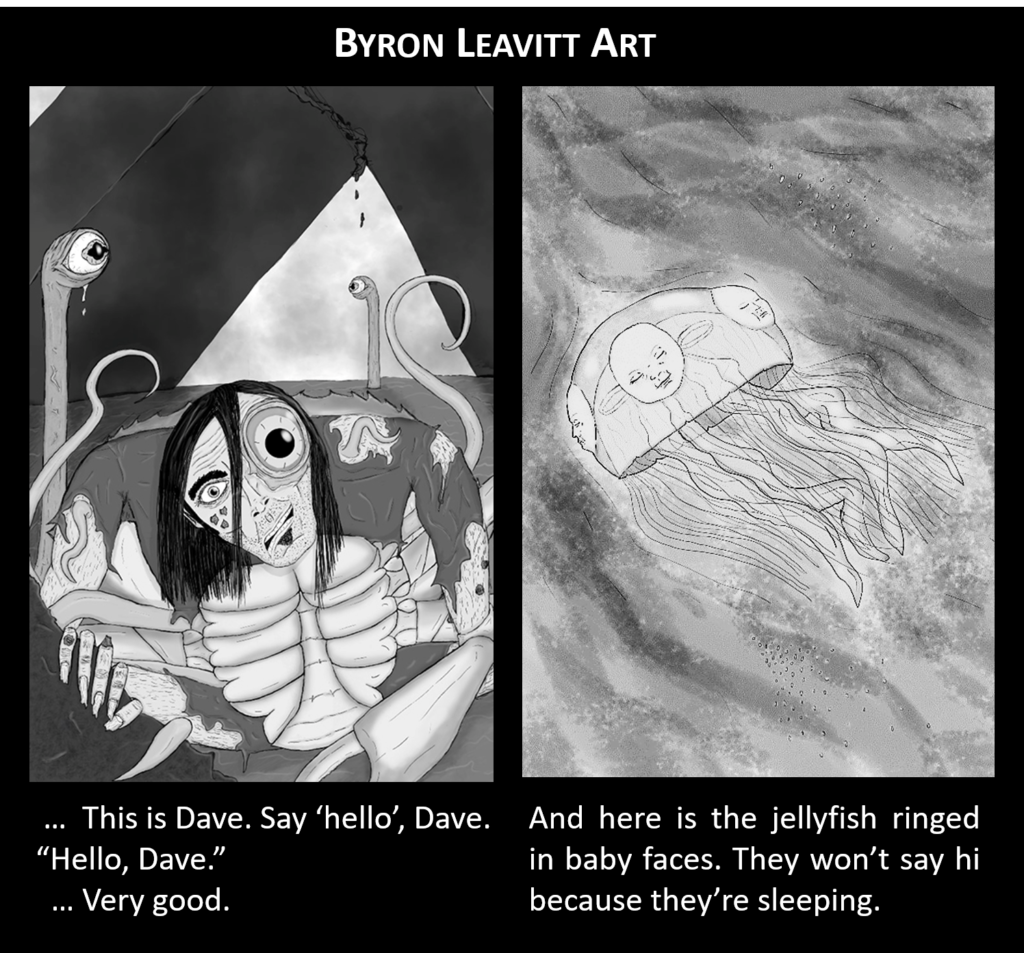
(9) OTHER DARK ARTS: YOUR DRAWINGS
SE: Do you practice other arts other than writing (spellcasting counts)? If so, can we share them (i.e., images of fine or graphic art) or mp3s/videos (of music). Likewise, can you discuss how art can from one medium can inform/inspire another?
BL: Ha! I don’t know that I’d call anything I’ve done “fine art.” I create a lot of different things, but the only one I would consider myself even halfway passable at is writing. What makes it even worse, perhaps, is that most of my work outside of writing has been the product of necessity. I don’t know, maybe that makes it more forgivable, but regardless, I’m definitely all about that guerilla DIY and duct tape.
Having said that, I do many things (even if not very many of them well.) I love creating in whatever form presents itself at the time. I’ve dabbled with art, mixed media, book design, web design, graphic design, sculpture, miniature painting, and other stuff. I sing, but I don’t have any instrument that I can say I’m particularly good at. I would love to get significantly better at many of these things I’ve mentioned. I guess time will tell if I succeed or not. Having said that, you asked, so here are a couple of sketches I made for my upcoming book The Fish in Jonah’s Puddle (To Say Nothing of the Demon). Like I said, they’re pretty mediocre. But hopefully the subject matter will at least be interesting.
As far as how different mediums can influence one another, I find that I’m an awful lot like a sponge. When I’m writing, I absorb stuff from wherever I can and then squeeze it back out into the story. Sometimes it’s from a board game miniature, or an art book, or a movie, or a video game. I can’t tell you how many items I ”sponged” for Shattered Seas, but there were a ton, including the video game Hellblade: Senua’s Sacrifice, Hieronymus Bosch’s paintings, a book of sketches used in Alien: Covenant, both the movie and the book Annihilation, the movies Silent Hill and Prometheus, bits and bobs from Guillermo del Toro, the news (part of it was written during the pandemic’s early days), and a bunch of miniatures (both Diemension Games stuff and others.) Furthermore, I’m constantly listening to music when I’m writing. Interestingly, when I don’t listen to music, my output is almost always significantly lower than when I am. It’s almost like I must have something going in to get something out. I know there are some writers who have to work in utter quiet. I am not one of those writers. In fact, I almost can’t do it.
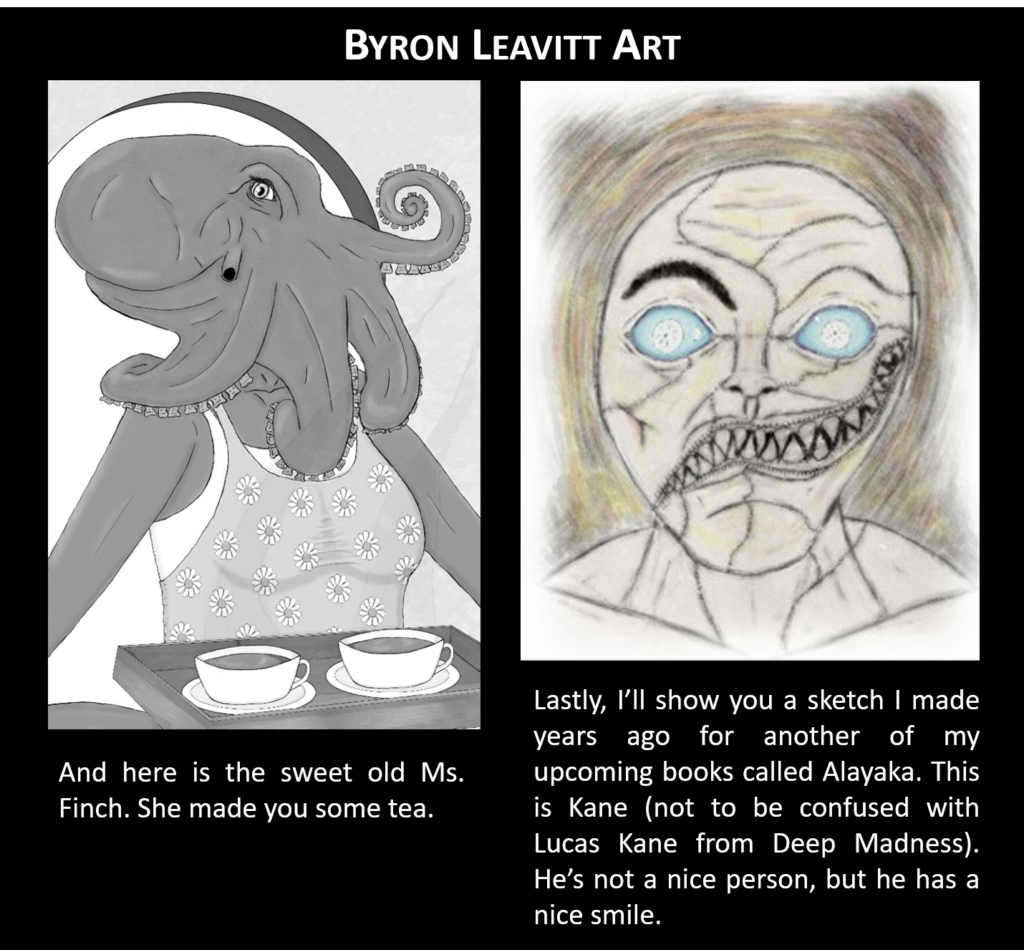
(10) MOVIE INFLUENCES
SE: Reading Shattered Seas, there is a scene that evoked the 1980 Superman 2 movie with Christopher Reeve. The villains (General Zod, Ursa and Non) were banished from Krypton into a 2D plane called the Phantom Zone. Also, the exhuming of the mysterious, submerged Sphere in Deep Madness reminded me of the 1987 adaptation of Michael Crichton’s “Sphere.” How have movies affected your work?
BL: Oh, man. I almost can’t quantify to what degree movies have influenced my work. They’re huge for me – and for the rest of the Diemension Games team, too. I don’t know that anyone actually has an accurate count of the number of references and influences there are in the Deep Madness board game. I think we regretted some of them later on, specifically when we decided we wanted to go in a more serious direction and expand the game’s setting into its own universe. But it doesn’t change the fact that those influences are all over the place.
Personally, I’m influenced immensely by a variety of directors and films. My favorite director is Guillermo del Toro, not just for his films but also for his take on monsters and some of his views on life and art. I think of him as a kindred spirit in many ways. I’m also influenced by many other directors and films. I love Darren Aronofsky, Tim Burton, Terry Gilliam, David Lynch, and anyone or anything that is weird and awesome. The list of movies that have inspired me is too long to write down for this interview.
As for Sphere, that reference is certainly intentional, though I’ve tried to steer us away from straight-up mimicry of it. (Whether I’ve succeeded or not is up to others to decide.) Sadly, the Superman 2 similarity is purely coincidental, as I’ve never seen it.
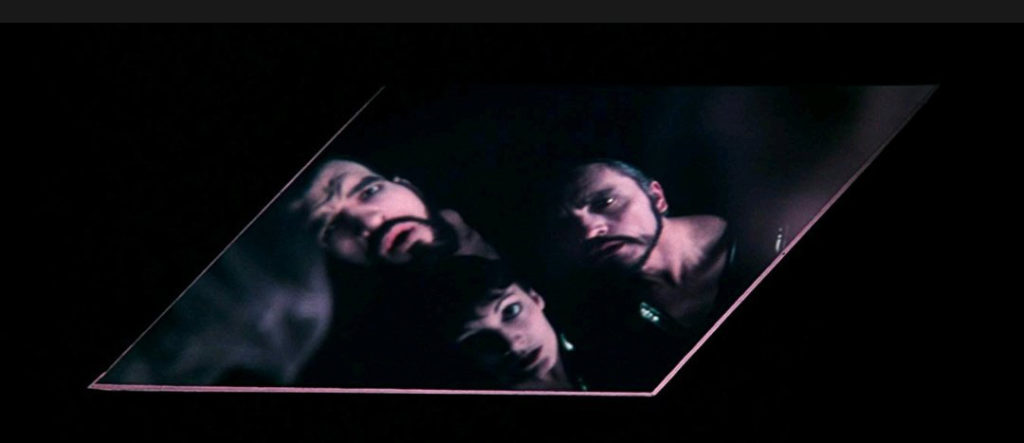
(11) Future Works
Outside of Diemension Games, your website mentions a world of Alayaka, and has a tab for Weird Church. Do tell! Or perhaps stay in the Diemension Games scope and tell us about your part in Celestial or Twisted Fables.
BL: On the personal side, Weird Church is currently a little Facebook group I’m starting for those geeks, artists, nerds, and weirdos who also want to pursue God, wonder, weirdness, and something beyond ourselves. It’s not actually a church, but it is definitely weird. Apart from that, the next novel I’m going to release will be the previously mentioned The Fish in Jonah’s Puddle (To Say Nothing of the Demon), which is a very strange, quirky little book about a boy named Jonah and a talking salmon named Stuart who strike out across the dimensions to stop the demon responsible for eating Jonah’s parents. After that, I hope to release my epic novel Alayaka, which is kind of a cross between dark fantasy, steampunk, body horror, and The Chronicles of Narnia. (A lot of writers have that one book they’ve obsessed over for years, and Alayaka is that for me.) I also have a bunch of short stories I’d like to get out if I can, including one of my favorite stories called “The Dance of the Krakens.” We’ll see how all of that goes.
On the Diemension Games side, our big projects right now are Dawn of Madness and Celestial. Dawn of Madness is a story-driven horror game that we hope will actually scare people (which I’m writing a bunch of books for), and Celestial is an epic game for 1-2 players that I like to describe as a cross between Chinese mythology, cyberpunk, steampunk, Lovecraftian horror, and Game of Thrones. Twisted Fables is a smaller 2 or 4-player fighting game that features reimagined fairytale heroines such as Red Riding Hood the cybernetic assassin and Little Mermaid the harbinger of the Kraken. It’s currently being manufactured. We’re also hoping to expand on our first game, Deep Madness, in the near future.
If you’d like to learn more about Diemension Games’ projects, you can find us on our website at https://diemensiongames.com or on Facebook at https://www.facebook.com/diemensiongames. If you’d like to follow me specifically, then you can find me on my website at https://byronleavitt.com or on Facebook at https://www.facebook.com/ByronCLeavitt. You can also email me at byron@diemensiongames.com. I’d love to hear from you.
Last of all, I just wanted to say thanks, Seth, for the chance to do this interview. It’s been a blast!
Thank go to you, Byron, for sharing!
S.E. Lindberg resides near Cincinnati, Ohio working as a microscopist by day. Two decades of practicing chemistry, combined with a passion for the Sword & Sorcery genre, spurs him to write adventure fictionalizing the alchemical humors (under the banner Dyscrasia Fiction). With Perseid Press, he writes weird tales in the same bloody vein (Heroika and Heroes in Hell series). He co-moderates the Sword & Sorcery group on Goodreads, and invites all to participate. He enjoys studying Aikido and creates all sorts of fine art in the family workshop. Touch base via Facebook.